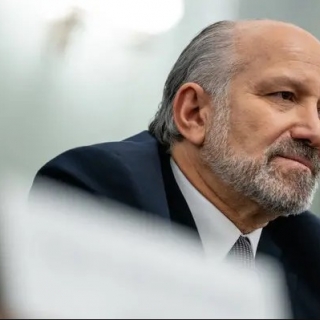


Commerce Secretary Howard Lutnick said that trade deals with South Korea and Japan could take significantly more time to complete than the framework agreement President Donald Trump announced Thursday with the UK, in a signal that some Asian partners may have to wait for tariff relief.
"You've got to spend an enormous amount of time with Japan, South Korea. These are not going to be fast deals," Lutnick said in an interview on Bloomberg Television.
Lutnick added that India has been "leaning in really hard" and the country was "certainly" a possibility to be among the next countries to reach an agreement. But, he cautioned, "this is a lot of work."
"When you talk about India, it's probably 7,000 lines" of tariffs to be changed or modified under a hypothetical agreement, Lutnick said. "It just takes time, and it just takes work — so give us a chance, don't be pushing and rushing."
At the same time, Lutnick said he was hopeful that initial deals could serve as templates for their respective regions, helping illustrate what kind of concessions Trump was looking for in exchange for tariff relief.
"We're trying to show people a frame for how to do business so that we can roll much more quickly, right?" Lutnick said.
The Commerce chief, who has taken a lead role in trade negotiations, said that Trump's 10% baseline tariffs remained a "bottom line" but that many nations would experience higher rates unless they moved aggressively to open their economies. He also said the UK deal showed ways that nations could see Trump roll back sectoral tariffs he's imposed on products like automobiles and metals that the president has deemed a national security priority.
Lutnick added that India has been "leaning in really hard" and the country was "certainly" a possibility to be among the next countries to reach an agreement. But, he cautioned, "this is a lot of work."
"When you talk about India, it's probably 7,000 lines" of tariffs to be changed or modified under a hypothetical agreement, Lutnick said. "It just takes time, and it just takes work — so give us a chance, don't be pushing and rushing."
At the same time, Lutnick said he was hopeful that initial deals could serve as templates for their respective regions, helping illustrate what kind of concessions Trump was looking for in exchange for tariff relief.
"We're trying to show people a frame for how to do business so that we can roll much more quickly, right?" Lutnick said.
The Commerce chief, who has taken a lead role in trade negotiations, said that Trump's 10% baseline tariffs remained a "bottom line" but that many nations would experience higher rates unless they moved aggressively to open their economies. He also said the UK deal showed ways that nations could see Trump roll back sectoral tariffs he's imposed on products like automobiles and metals that the president has deemed a national security priority.
Source : Bloomberg
President Donald Trump said Wednesday he plans to send a single letter to over 150 countries outlining the tariff rate they will face, saying, "It's all going to be the same for everyone, for that gro...
The U.S. central bank will probably need to leave interest rates where they are for a while longer to ensure inflation stays low in the face of upward pressure from the Trump administration's tariffs,...
US President Donald Trump plans to impose tariffs of over 10% on smaller countries, including nations in Africa and the Caribbean, as the Associated Press reported. "We'll probably set one tariff for...
President Donald Trump warned on Monday that he would impose secondary tariffs of 100% on Russia if a peace deal with Ukraine isn't reached within 50 days. "We are going to be doing very severe tariff...
The European Union announced on Sunday that it will extend its suspension of countermeasures to U.S. tariffs until early August, aiming to pursue a negotiated settlement. This comes after President T...
Gold prices rose on Friday (July 18th), but were on track for a weekly decline as concerns about the US Federal Reserve's independence eased and strong US data emerged, while platinum rose to a nearly 11-year high. Spot gold rose 0.3% to $3,349.49...
Gold prices rose to a new daily high during the European session on Friday (July 18th), continuing their rebound from a low hit more than a week earlier. This increase was driven by a weakening US dollar following dovish remarks from Fed Governor...
The Hang Seng Index surged 327 points, or 1.3%, to close at 24,825 on Friday (July 18th), reversing two days of declines as all sectors rallied. The index hit a four-month high and rose 2.8% for the week, marking its second consecutive weekly...
 U.S. consumer prices increased by the most in five months in June amid higher costs for some goods, suggesting tariffs were starting to have an...
U.S. consumer prices increased by the most in five months in June amid higher costs for some goods, suggesting tariffs were starting to have an...
 European stocks erased early gains and closed mostly lower on Tuesday as markets continued to assess how potential tariffs from the US may hurt...
European stocks erased early gains and closed mostly lower on Tuesday as markets continued to assess how potential tariffs from the US may hurt...
 The U.S. central bank will probably need to leave interest rates where they are for a while longer to ensure inflation stays low in the face of...
The U.S. central bank will probably need to leave interest rates where they are for a while longer to ensure inflation stays low in the face of...
 President Donald Trump's renewed calls for Federal Reserve Chair Jerome Powell's resignation have prompted investors to protect portfolios against...
President Donald Trump's renewed calls for Federal Reserve Chair Jerome Powell's resignation have prompted investors to protect portfolios against...